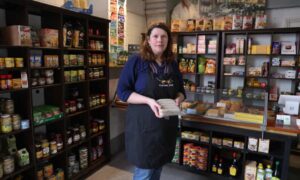
German Deli in east London is known for its wide variety of traditional sausages, but the post-Brexit border changes brought in last month means stocks are running worryingly low.
Offering 22 types of fresh sausage, from the classic Bavarian leberwurst to the Oktoberfest currywurst, the online retailer has become popular with expats and lovers of German cuisine since it launched in 2004.
But the company’s accounts manager, Susann Schmieder, says: “We only have stuff left over from before the new border changes came in, and those are approaching their best before dates.”
It has not received a delivery of sausages at its warehouse in Walthamstow since 31 January, when the government brought in the first stage of its border target operating model (BTOM), which requires a vet to sign off all meat and dairy imports before they can be shipped.
“The issue is our supplier is still waiting for feedback from their local food and veterinary office on which papers and checks they need,” Schmieder said.
German Deli is far from alone. Other UK delis are struggling to stock some of their staple goods as their European suppliers wrestle with new the post-Brexit import rules. One in London that stocks products from across the continent expects a dozen of its providers to stop exporting to the UK because of the new red tape.
Another, ScandiKitchen, also in London, has stopped stocking 20 items, largely sausages and pates, because of confusion about what was required
Its managing director, Jonas Aurell, who has run the business since 2006, said: “Our main suppliers are struggling to get all the paperwork together and getting their head around it. We’re looking for other suppliers to fill the gap.”
Another key supplier had abandoned the UK completely because it did not have the resources to cope with the paperwork, instead focusing on its domestic market, he said.
Schmieder, who says she has lost sleep over the situation, said German authorities were still unsure of what exactly UK government required.
“When I rang the UK government to ask what our supplier needed to do, it said I had to get in contact with our local veterinary office in Germany. It’s completely stupid,” she said.
Even if her supplier does get through the certificate impasse, it has said it will probably have to cut the number of sausage types it supplies from 16 to just four, because of the cost and time associated with obtaining the health certificates.
Major disruption at the border has been averted so far by the government taking a light-touch approach to the checking paperwork, but it will introduce new border checks on 30 April that will involve astricter regime for those that do not have correct documentation.
David Josephs, the chief executive of Panzer’s Delicatessen in St John’s Wood, north London, said the latest requirements were just adding another layer of red tape for businesses trying to bring in products from Europe.
